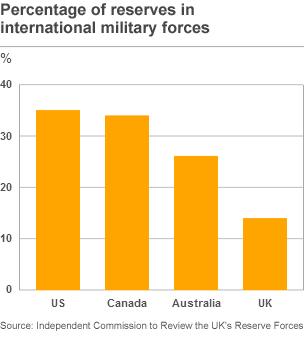Army reservists to receive more benefits
- Published
Philip Hammond: "These measures represent a substantial percentage increase in total reserve remuneration"
Army reservists are to get military pensions and healthcare benefits as part of a bid to increase numbers, the defence secretary has announced.
Philip Hammond said they would also get increased remuneration, in a move designed to drive up reservist numbers from about 20,000 to 30,000 by 2018.
He said changes were needed to ensure Britain's future military capabilities, as the regular army is reduced.
But critics have said it is an attempt to create "an army on the cheap".
The White Paper proposals, external come nearly three years after the coalition said it would reduce regular army numbers from 102,000 to 82,000.
Mr Hammond told the Commons the government would invest £1.8bn over 10 years in the reserves, the UK's part-time military.
"We recognise the extraordinary commitment reservists make and in return we commit to deliver the reservists a challenging and rewarding experience, combined with an enhanced remuneration and support package and an improved deal for employers," he said.
Army Reserve
He also confirmed the intention to change the reserve force name from the Territorial Army to the Army Reserve to better reflect the future role.
For the first time reservists will be entitled to a day's paid leave for every eight they serve, meaning that overall they will get a "substantial percentage increase" in their remuneration, said Mr Hammond.
From April 2015, reservists will be able to accrue armed forces pensions while training, as well as when deployed, and will have access to healthcare benefits similar to those given to serving soldiers.
The MoD estimated that the new provision for paid annual leave would be worth £200 per year gross to a private, and £420 to a captain.
Over 10 years a private could potentially build up £1,770 per year in pension, payable at state retirement age. The figure for a captain could be £2,420 per year.
Army reservists are paid a minimum of £35 per day, rising to £121 for a major.
They receive a tax-free "bounty" of up to around £1,700 for completing a minimum amount of training in a year - which could be 19 days or higher.
The White Paper says the Reservist Award - which tops up military pay to the same level as civilian salary - is "critical" for the mobilisation process.
Mr Hammond also announced a £5,000 "signing-on bounty" for ex-regulars who sign up to the reserves.
'Job is changing'
Meanwhile, small private sector firms employing part-time soldiers will get an extra £500 per month when they are on deployment and more notice will be given for deployments.
And companies that discriminate against staff who want to serve will be more open to action at employment tribunals.
He said: "The job we are asking our reservists to do is changing. The way we organise and train them will also have to change."
Simon Bowers: "He spends a lot of weekends sleeping in the back of trucks and on training exercises"
The number of fully-trained army reservists is expected to rise to 30,000. But across the three services the fully trained force size is expected to grow to 35,000, said Mr Hammond.
Mr Hammond also said about £40m of investment in kit, such as night vision kit and helmet cameras, would be brought forward.
Some 26 reservist bases - of a total of 334 - are to be closed as part of the reorganisation, he said.
MPs in the Commons chamber were not passed copies of the list of bases until several minutes after Mr Hammond had stopped speaking, prompting anger from some MPs.
Commons Speaker John Bercow said "the administration of this matter has been woefully inadequate and frankly utterly incompetent" while shadow defence secretary Jim Murphy said it was "a shameful way to behave".
'See danger'
Critics of the plans said they were sceptical that enough reservists could be trained and ready to deploy in time.

Conservative MP Col Bob Stewart said: "I very much hope that we will get 30,000 trained and deployable reservists by 2018. But recently over the last year, recruitment to the Territorial Army, and now the Reserves Army, has not been great and so I am slightly pessimistic.
"In 2018, will the armed forces be blamed if 30,000 reservists are not trained and deployable by then?"
He has previously accused the government of "trying to get as inexpensive an army as possible... an army on the cheap".
Liberal Democrat MP Bob Russell, who sits on the defence select committee, said he was opposed to cutting regular forces and trying to replace them with reservists.
"The reservists I have seen in the field are absolutely brilliant, they've slotted in seamlessly. My concern is that if the proportion of reservists increases and the number of full-time regulars decreases that perhaps that mix, that blend, will not be as effective as it has been," he said.
The latest plans come as a result of the almost 8% cut to the MoD budget announced in 2010.
- Published3 July 2013
- Published3 July 2013
- Published3 July 2013
- Published18 June 2013
- Published12 May 2013
- Published8 November 2012
- Published14 October 2012